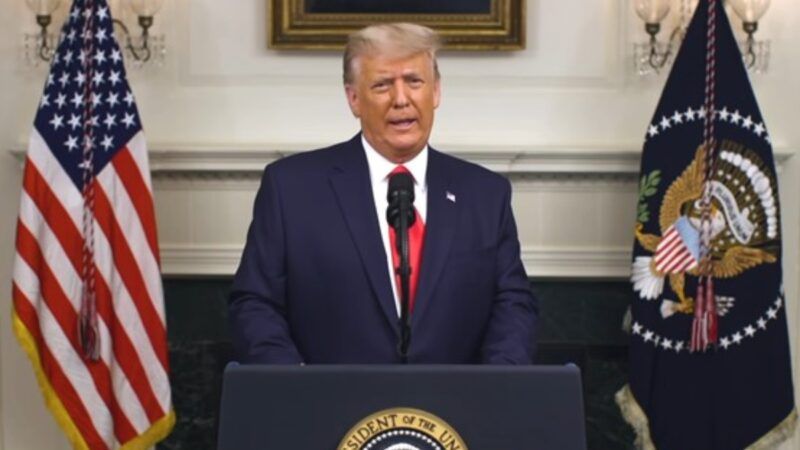Trump Threatens to Sink COVID-19 Relief Bill Unless Congress Cuts Wasteful Spending, Spends More on $2,000 Stimulus Checks
"It truly is a disgrace," said Trump.

COVID-19 relief might now be in jeopardy following a late-night rant from President Donald Trump, who demanded that Congress cut wasteful spending from its $2.3 trillion spending package while also approving additional spending: $2,000 stimulus checks for all Americans.
"The bill they are now planning to send back to my desk is much different than anticipated," said Trump in his remarks Tuesday evening. "It truly is a disgrace."
The 5,000-page, $2.3 trillion legislative package passed by Congress on Monday included two different bills: a $1.4 trillion omnibus spending bill and the $900 billion dedicated to pandemic relief.
— Donald J. Trump (@realDonaldTrump) December 23, 2020
"It's called the COVID relief bill but it has almost nothing to do with COVID," said Trump, referring to the two bills interchangeably.
Of particular concern to the president were a number of admittedly dubious appropriations for foreign aid, scientific research, and federal facilities in the omnibus spending bill.
"This bill contains $85.5 million for assistance to Cambodia, $134 million to Burma, $1.3 billion for Egypt and the Egyptian military, which will go out and buy almost exclusively Russian military equipment," said Trump. "$40 million for the Kennedy Center which is not even open for business. $1 billion for the Smithsonian, and an additional $154 million for the National Gallery of Art. Likewise, these facilities are essentially not open."
In total, Trump explicitly named some $4 billion in spending he considered wasteful.
"Despite all this wasteful spending and much more, the $900 billion package provides hard-working taxpayers with only $600 each in relief payments and not enough money is given to small businesses and in particular restaurants," said Trump, possibly referencing the exclusion of the $120 billion RESTAURANTS Act from the coronavirus relief bill.
The president said Congress should get rid of a two-year sunset clause on a tax deduction for business meals included in the package, increase stimulus checks from $600 to $2,000 per person, and cut some of the aforementioned wasteful spending.
"I'm also asking Congress to immediately get rid of the wasteful and unnecessary items from this legislation, and send me a suitable bill or else the next administration will have to delivery a COVID relief package and maybe that next administration will be me," said Trump, referencing his apparent belief that he might somehow stay in office despite, you know, losing the election.
Trump's support for $2,000 stimulus checks is not new. The Washington Post reports that his advisers talked him out of that demand at the last minute, lest he endanger the entire relief package.
To be sure, the president's broadsides against a spending deal that includes lots of money for "lobbyists, foreign countries, and special interests" is certainly welcome, and, frankly, on target. The president was also right to criticize the rushed legislative process that sent this special interest-laden spending package to his desk.
The trouble is that the conditions Trump outlined for supporting relief legislation would make the bill much worse. Middle-class Americans do not need an additional $2,000 in federal support. A $900 billion relief bill that includes generous, targeted benefits—including expanded unemployment benefits, relief for renters, and boosted food stamp spending—doesn't need more spending on universal programs that will mainly benefit Americans who are currently receiving a paycheck.
The $1,200 stimulus checks included in the CARES Act cost taxpayers roughly $300 billion. Upping stimulus checks to $2,000 from the current $600 amount would tack on roughly $350 billion to the coronavirus relief bill's costs. In exchange, Trump is demanding to cut some $4 billion or so in frivolous spending.
One need not be a deficit hawk to understand that the math doesn't add up.
Rent Free is a weekly newsletter from Christian Britschgi on urbanism and the fight for less regulation, more housing, more property rights, and more freedom in America's cities.


Show Comments (294)